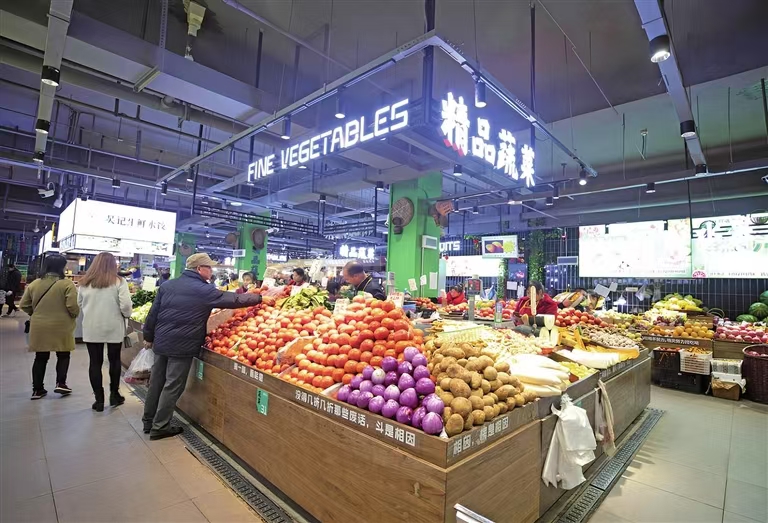 Bridging News
Bridging News
Chongqing Achieves Zero-Waste Index of 84.76 Points in Q3, up 9.03 Points
Chongqing - Southwest China's Chongqing municipality recently unveiled its Zero-Waste Index for the third quarter of 2024. The municipality achieved a score of 84.76 points, an increase of 9.03 points compared to the second quarter.

The Shihuishi Vegetable Market is the city's first Zero-Waste Vegetable Market. (Photo/Chongqing Ecology and Environment Bureau)
Chongqing has introduced a Zero-Waste City index system, second only to Zhejiang Province in China. This system includes 15 indicators across seven categories, such as industry, agriculture, and construction, measuring waste management efficiency from industrial solid waste to agricultural by-products.
In the third quarter, 22 of Chongqing's districts and counties met the city's average score, representing 53.66% of the total. This is an improvement of 4 districts compared to the previous quarter.
Furthermore, the city's regional breakdown reveals significant progress as well. The main metropolitan area scored an average of 86.54 points, and the Three Gorges Reservoir Area in northeastern Chongqing scored 83.89 points. In comparison, the Wuling Mountain area in the southeast scored 78.85 points, reflecting a narrowing gap across regions.
The Zero-Waste Index was developed to quantify the progress of the city’s "Zero-Waste City" initiative. Chongqing's efforts have been comprehensive, involving more than 2,500 Zero-Waste City Cells across various sectors, including food, clothing, housing, and transportation.

A courier packaging recycling station in a college in Chongqing. (Photo/Chongqing Ecology and Environment Bureau)
One notable achievement in the city's waste management infrastructure is the Qianjiang District Domestic Waste Incineration Power Plant, which began operation at the end of last year. This facility, the largest in the Wuling Mountain area, has a daily capacity of processing 700 tons of waste and generates over 40 million kWh of electricity annually. The plant is pivotal in transforming waste into renewable energy, further contributing to the city's eco-friendly agenda.
In addition to waste incineration, Chongqing has also implemented innovative solutions for organic waste management. Using high-temperature anaerobic processes, the Qianjiang District Kitchen Waste Treatment Center transforms kitchen waste into clean natural gas and biodiesel. The center produces an annual output of 2.5 million cubic meters of natural gas and 2,700 tons of biodiesel.
Chongqing has made significant strides in managing industrial waste. The utilization rate of general industrial solid waste reached 76.77%, surpassing the national average of 57%. The city's hazardous waste disposal rate is also commendable at 91.1%, well above the national rate of 55%, according to the data from the Chongqing Ecology and Environment Bureau.
"The development of a 'Zero-Waste City' is directly aligned with efforts to reduce pollution and carbon emissions while simultaneously improving the quality of life for residents," said Xiang Ting, deputy director of Chongqing Ecology and Environment Bureau.
"By integrating digital tools, Chongqing will streamline operations, including online platforms for declaring, assessing, and certifying zero-waste status across different sectors. This initiative will support the creation of a closed-loop system that drives innovation and strengthens environmental sustainability across all districts," Xiang added.
 Related Stories
Related Stories